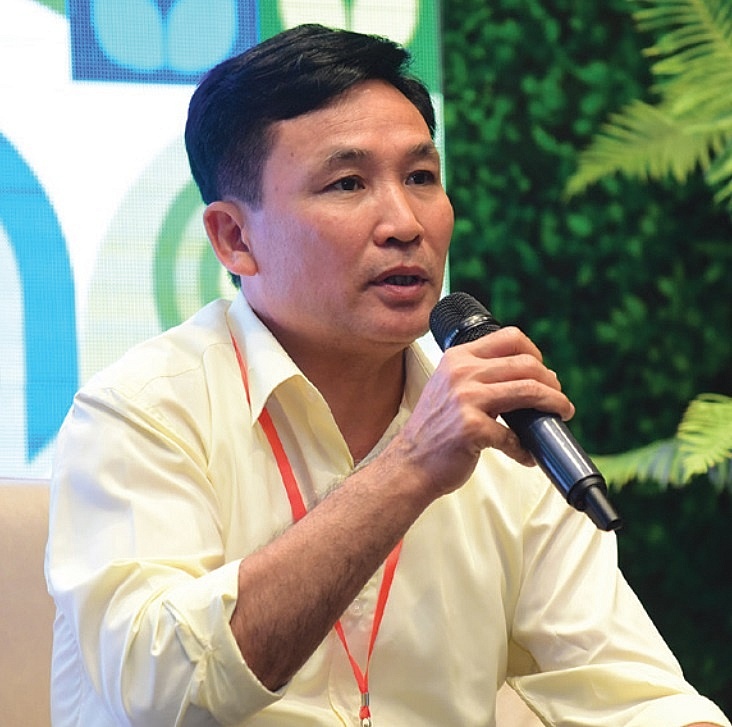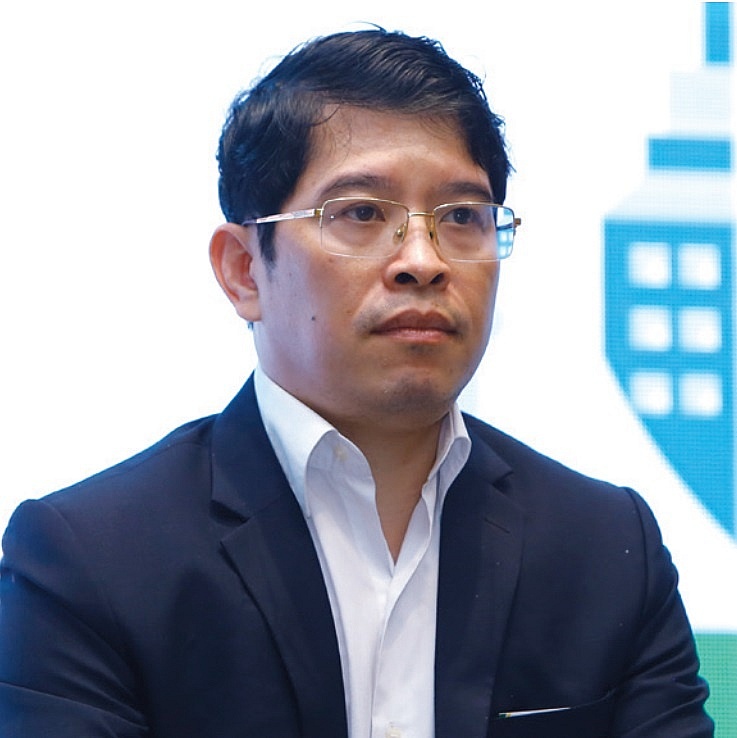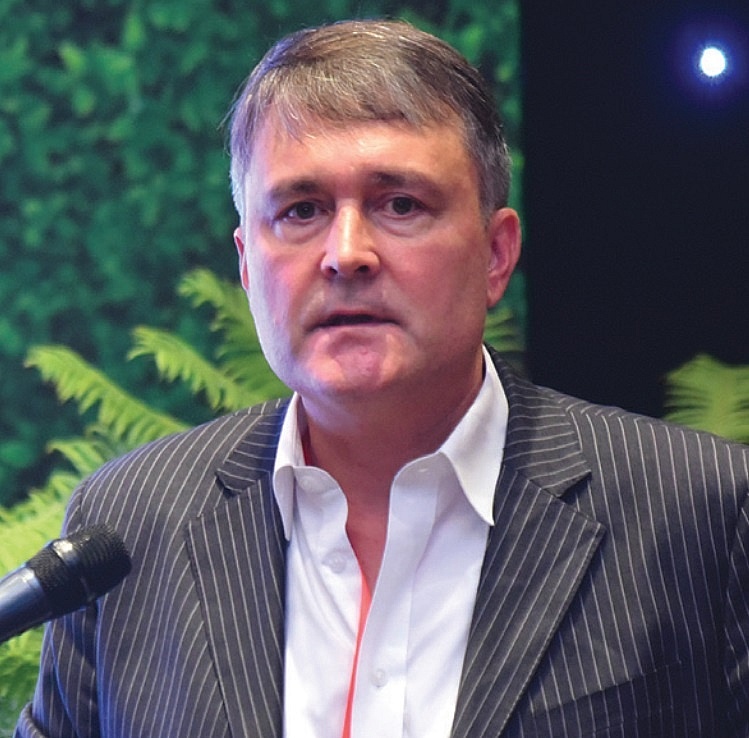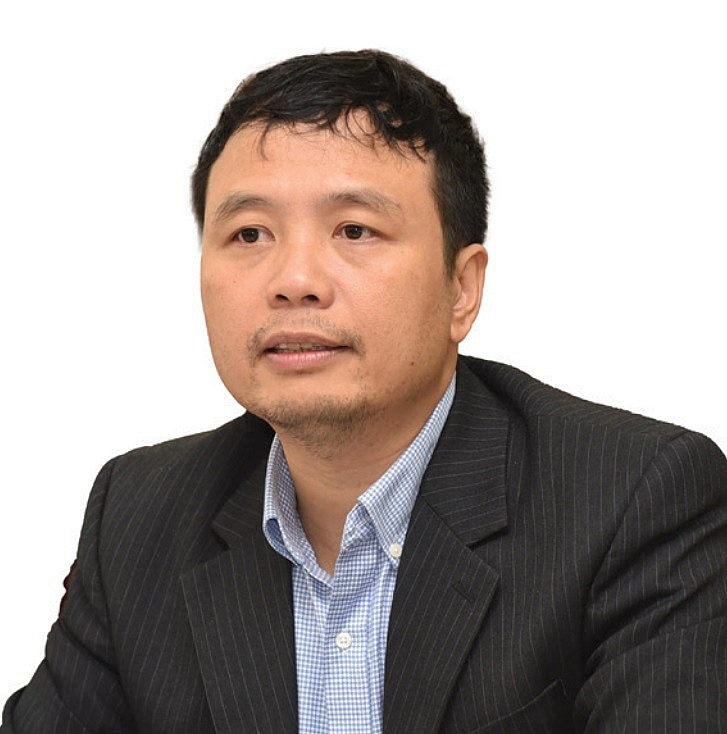ESG standards fit for the country
| Bui Thu Thuy, deputy director general Agency for Enterprise Development Ministry of Planning and Investment
Up to 90 per cent of businesses have some awareness of ESG, but it is challenging to identify how to do it. National green growth plans have already been issued, but we need to point out specifically how to achieve those goals and net-zero by 2050. We need answers suitable for all businesses and individuals. Among the three factors, governance is the hardest for businesses to improve. Most Vietnamese enterprises are small and on a household scale, and an employee has to carry out many tasks and positions. So it is too difficult to enhance their governance, which can contribute to implementing the two remaining factors more easily. The Ministry of Planning and Investment (MPI) is drafting and submitting a green economic sub-sector system, for example, in transportation, which involves green projects and methods. The MPI is also building incentive policies to support enterprises to implement ESG. For example, there are supporting policies for VinFast to build charging stations. The more charging stations there are, the more green cars and bikes people can use. At present, the MPI is working with international partners to support enterprises. Over the last two years, these types of projects have already improved the awareness of about 10,000 firms and filtered 300 firms to improve capacity to inventory greenhouse gases, and built a roadmap to transit to sustainable business. | |
| Nguyen Van Dinh, chairman and director International En Vang (IEV)
After more than 20 years as a renowned transportation company in Haiphong, IEV has decided to transition its entire fleet from petrol to electric vehicles (EVs). Our commitment is to find efficient business solutions that also contribute to the community. The infrastructure for EVs in Vietnam, however, is not yet well-developed, making this goal challenging. Nevertheless, shareholders decided that starting in 2024, we would cease investing in petrol vehicles and transition to EVs. Our partnership with VinFast acts as an extended arm, bringing EVs to many customers. We aim to reduce other costs because operating EVs is more economical than petrol vehicles. Transitioning to EVs involves facing numerous difficulties and large investment costs. Another critical factor is that businesses typically only change their investments at the end of a product’s lifecycle, so determining what to do with existing petrol vehicles is a challenge. Moving towards EVs is the future trend, and this change helps the company contribute to environmental protection. As a transportation company dealing with environmental pollution daily, making a change for a better environment is urgent. The practical results have been validated through customer experiences and safe operations. Operating costs are 20-30 per cent lower compared to petrol vehicles, and maintenance costs are also cheaper. Haiphong has always encouraged businesses to pioneer green and sustainable development, but so far, there has been no specific support. We strive to keep EV fares on par with petrol vehicles, hoping that specific support policies will soon be in place to give businesses more confidence and encourage them to boldly make changes towards achieving the net-zero emissions target by 2050. Currently, major taxi companies like Mai Linh and Vinasun are hesitant to invest in EVs due to existing challenges, but I have no regrets about switching to EVs. If solar energy is effectively utilised, it will further reduce the costs of operations. | |
| Nguyen Dinh Tho, general director
Institute of Strategy and Policy on Natural Resources and Environment Vietnam has strong commitments to join the international community in reducing emissions, promoting energy transition, and developing a low-carbon economy towards a circular economy. Thus, on the journey to hit net-zero, practising ESG becomes a mandatory requirement, and recent regulatory adjustments are aimed at making ESG a compulsory element of compliance. I hope that the business community will approach this as a battle for survival, forcing businesses to fight. At first, a business may not be aware of the importance of implementing ESG, but they will have to take time to adapt to it. Vietnam participates in the World Trade Organization and businesses have to comply with the rules of international trade. When the government introduced new compulsory bike helmet regulations or applied regulations to check alcohol levels on the roads, many were confused in terms of compliance. However, they are all compulsory requirements, and so everyone must carry them out. Although ESG has become a compulsory requirement, state management agencies are still in the direction of encouraging businesses to practice it. They have been following the direction of providing dedicated and thoughtful guidance to businesses so that they can access and comply with requirements in accordance with international standards. When implementing ESG, businesses will be burdened according to the general principle that emitters must pay. Therefore, when the Ministry of Natural Resources and Environment built the Law on Environmental Protection, we changed our approach, and we determined that businesses not only need support from the state management authorities, but also they need to have the correct market tools. | |
Nguyen Van Thanh, global CEO Green and Smart Mobility
Vietnam ranks 36th out of 117 countries in terms of pollution, with the transportation sector being the largest emitter. The government has committed to achieving net-zero emissions by 2050, which drives the development of green enterprises like Xanh SM. From the outset, we positioned the brand to lead the green transportation sector, aligning with global trends and the Vietnamese government’s commitments. Xanh SM aims to create significant value for customers and partners and, after one year, we have over 30 partners and 50,000 electric vehicles in 40 provinces and cities, reducing more than 52,000 tonnes of CO2. Xanh SM is the first platform in Vietnam to offer a 100 per cent electric fleet, striving to expand nationwide. The company plans to operate in at least 60 provinces by the end of this year, contributing to a reduction in CO2 equivalent to 2.6 million trees a year. The transport market, valued at $1.4 billion in 2023, is growing at an annual rate of 15-20 per cent, with substantial growth potential. The ride-hailing sector in Vietnam is expected to continue growing significantly over the next 20 years. We have initiated a new ESG business model in Vietnam and expanded it globally, and we are the only pure electric platform provider in Vietnam with an international presence. Xanh SM aims to be present in seven countries, and we have launched in Laos and are preparing to enter Indonesia. Vietnamese consumers prioritise environmentally friendly products, and Xanh SM has gained strong support for this reason. Despite being a new startup, Xanh SM has served 50 million customers within its first year and is frequently the most downloaded app in Vietnam on the Apple Store and Google Play. A distinguishing feature of Xanh SM is that its drivers are employees, not partners, ensuring rigorous training and service quality control. The services exceed average standards, particularly in tourist provinces, earning high praise from international visitors and adding value to communities. Our partners are committed to deploying over 10,000 electric motorbikes and cars for their services, potentially expanding the model. The business community is our left hand, and individuals are our right hand. Everyone can be a green ambassador. | |
Nguyen Thi Quynh Nhu, CEO, WBS Solution and System
Over the past few years, businesses have been keen on bringing their products to the global market. However, it remains challenging for businesses to access green capital. They are also facing more pressure to meet green criteria related to global trade, manufacturing, and sustainable reporting. In particular, banks have pushed forward strict criteria for loan applications to green finance. As a result, most businesses have difficulties obtaining green finance due to a lack of ESG practices. When speaking with businesses, I have learnt that several loan applications have not been approved. The main reason is that the level of compliance with ESG standards remains low among Vietnamese companies. I suggest that businesses should not wait until they seek capital sources to integrate ESG. Instead, they should have a long-term plan and strategy because it takes time to achieve success in sustainable development goals. Vietnam needs substantial investments for its climate change response. We hope that more industry leaders will take a lead and encourage other businesses to follow suit and create a green operating environment in Vietnam. | |
| Nguyen Thi Bich Ngoc, deputy Minister of Planning and Investment
Green growth is an urgent trend, a driving force for economic growth, and a key to improving national competitiveness during the international integration. In this journey, many economic experts believe that ESG is a new game in terms of corporate responsibility to society. In addition to corporate profits, businesses must also pay attention to the social environment because large businesses now realise that promoting and growing such criteria is good for sustainable development, with long-term benefits for shareholders and the community. Large businesses all integrate these criteria in the development process, a mandatory game for businesses if they want long-term growth. In Vietnam, green growth and social justice is not only an inevitable choice but part of keeping up with world trends, to fulfill a landmark commitment of reaching net-zero by 2050. Vietnam is also in the process of development, so it is necessary to solve the problem of keeping a high growth rate, but still developing sustainably. In recent years, the business community has taken many practical actions to contribute to Vietnam’s green growth goals, such as using clean energy, and environmentally friendly materials, and pouring into modern and high-tech production lines with less-using resources and energy, minimising emissions. But now, we should further promote this process, for the sustainable development of businesses and Vietnam’s economy. With its potential and position in the global supply chain, Vietnam has a huge opportunity in green growth to transform, surpass, and create momentum for a leap forward in socioeconomic and environmental development. Businesses have great opportunities to transform themselves, improve competitiveness, and participate more deeply in global value chains. If participating in large markets, they must identify regulations related to ESG; otherwise, they will lose the potential to integrate into such value chains. Understanding this framework will bring Vietnamese businesses greater opportunities. The Ministry of Planning and Investment (MPI) is acting as an advisory agency to the government on the National Green Growth Strategy, and it wants to mobilise financial resources to create an environment for green and sustainable investment by building a list of key green growth projects to be completed by the end of the decade. The MPI, in coordination with the US Agency for International Development, has announced the 2024 ESG Initiative for the second year to help the Vietnamese business community seize new opportunities amidst the green transformation. Under this initiative, we aim to promote practices in the private sector to conduct business sustainably and work within an ESG assessment framework to measure factors related to sustainable development, as well as the impacts of business activities on the community. We look forward to receiving the support and participation of the Vietnamese business community for the implementation of this initiative. | |
| Matthew Smith, head of Research Institute Yuanta Vietnam
Developed nations such as the United Kingdom, Canada, Japan, and Australia are increasingly mandating investors to adopt ESG policies. Among these countries, Canada stands out with the highest allocation of capital to ESG investments, accounting for 62 per cent of its assets. Meanwhile, Australia and Europe appear to be showing a decline. However, this apparent decrease is not due to a reduction in investments, but rather stricter classifications by European and Australian regulatory bodies on what qualifies. Consequently, companies and investors that were not genuinely adhering to ESG policies but claimed to do so have been excluded from these figures, giving the illusion of a decline while the actual amount of money invested continues to grow. Bloomberg estimates that ESG assets under management totalled $30 trillion in 2022 and are projected to rise to $50 trillion by 2030. Therefore, in the next 5-6 years, we will see tens of trillions of US dollars in assets managed by institutional investors focused on these areas. This is particularly significant for businesses seeking capital from global markets, as more funds in the future will be allocated to ESG. The drive for such investment is not only propelled by institutional investors ahead of government regulations but also significantly influenced by individual investors, who are not subject to mandatory regulations. The proportion of individual investors participating in ESG investments has increased from 20 per cent in 2016 to 25 per cent in 2018. | |
| Phan Dang Bao, sustainability deputy director Lam Tran Plastic Recycling
We not only highlight the recycling of soft plastic packaging, but are also strongly committed to the principles of ESG. We not only aim to reduce plastic waste, but also utilise opportunities to create sustainable solutions, develop communities, and promote good governance in all business activities. Since its establishment, Lam Tran has been adopting sustainable solutions and improving product quality to optimise and protect resources. Lam Tran’s recycling capacity is estimated at 1,000 tonnes per month, equivalent to about 2,000 tonnes of soft plastic waste materials including plastic bags and food packaging. However, the collection and classification of soft plastic waste in Vietnam are struggling with some difficulties. There is still no standard or method of collection and classification at the source. To ensure the quality of input raw materials, we need standards for input scrap sources and build a domestic collection and classification team, going to each collection point to check, evaluate, and propose the most effective solutions. We hope to receive more support to develop the collection and classification facilities. The application of extended producer responsibility regulations this year will be a driving force to promote recycling and reduce plastic waste in Vietnam. | |
| Nguyen Tu Anh, director, Centre for Economic Information, Analysis, and Forecasting Central Economic Commission
ESG standards are a measure of the true value of a business. Implementing ESG not only makes businesses feel that their successes are more meaningful and more inclusive, but also makes it easier for businesses to succeed in a context where the awareness of the issues of society and the environment of the community is increasing. Many studies indicate the benefits of applying ESG standards in a globally integrated environment, such as increasing market share, reducing costs, reducing legal pressure, and optimising investment and asset holding. Although these research results may not be complete, they also reflect an irreversible trend in production and business activities, in which production and business must be responsible not only to the community, employees, and society but also to future generations. For Vietnamese businesses, the application of ESG is not only consistent with Asian culture and philosophy but also a realisation of the Party and state’s policies on sustainable development. In the context of serious climate change and an uncertain global economic environment, applying ESG or at least instilling the ideology of the criteria in business operations will be an important approach to help businesses develop sustainably. | |
| Nguyen Giang Nam, deputy CEO, BCG Energy
The growth challenge for the business community is becoming even more daunting. Achieving such targets is already a major challenge, but ensuring that growth is coupled with ESG practices is even more complex. This often leads to increased costs, stricter and more complicated operational conditions, reduced profits, and weaker competitiveness. As Vietnam aims for net-zero, the development of renewable energy is inevitable. To achieve net-zero, renewable energy must account for over 70 per cent of the electricity supply. Accordingly, BCG Energy is following the Vietnamese government’s direction for developing renewable energy to serve its sustainability goals. Last year, we acquired Tam Sinh Nghia Investment Development, which was licensed to handle household waste. Currently, Tam Sinh Nghia operates waste treatment and incineration plants in Ho Chi Minh City, and Long An, and Kien Giang provinces. In August 2023, we partnered with a leading ESG data technology company in Asia. We aim to be transparent about the emissions of our group and its member companies, as implementing ESG in business operations builds credibility with both domestic and international investors. Through this, we attracted approximately $60 million from foreign investment funds and gained the trust of investors and partners in Vietnam. Regarding existing issues, during our work with foreign entities, they showed great interest but noticed a lack of criteria and scoring methods for ESG application. The application of criteria can be integrated into various current processes. For example, when the department of planning and investment approves investment policies for enterprises, it can incorporate ESG criteria into the decision. Similarly, banks can integrate ESG criteria when reviewing loan applications and include specific requirements in the documentation. Another issue is how investment capital is accessed. ESG investments in manufacturing enterprises sometimes require substantial capital, and businesses need support from agencies and relevant ministries. In reality, green investments often involve high costs, and the calculated profits before investing may not meet expectations, affecting investment efficiency. Therefore, when businesses choose clean green technology and higher environmental standards, they hope for support such as land and tax incentives. |
 | Tough nut to crack for businesses to embrace ESG Enterprises in Vietnam are being advised to apply environmental, social, and governance principles as soon as possible, as an effective tool to ensure their competitiveness. |
 | ACCA APAC Dialogue 2024 set for Hanoi The ACCA APAC Dialogue 2024 event (ACCA Asia-Pacific Forum 2024) organised by the Association of Chartered Certified Accountants (ACCA) will officially take place on May 28–29 at JW Marriott Hotel Hanoi. |
What the stars mean:
★ Poor ★ ★ Promising ★★★ Good ★★★★ Very good ★★★★★ Exceptional
Related Contents
Latest News
More News
- The next leap in Cloud AI (December 11, 2025 | 18:19)
- Vietnam’s telecom industry: the next stage of growth (December 11, 2025 | 18:18)
- Five tech predictions for 2026 and beyond: new era of AI (December 11, 2025 | 18:16)
- CONINCO announces new chairman and CEO (December 10, 2025 | 11:00)
- How AWS is powering the next-gen data era (December 09, 2025 | 13:14)
- Outlook in M&A solid for Singapore (December 08, 2025 | 10:31)
- Vietnamese firms are resetting their strategy for global markets (December 05, 2025 | 17:04)
- LPBank Securities accelerates AI and data innovation with AWS (December 05, 2025 | 09:00)
- Improving traceability capacity with Zebra Technologies (November 26, 2025 | 10:08)
- Ho Chi Minh City engages 500 CEOs in dialogue on building global megacity (November 25, 2025 | 16:00)











 Tag:
Tag:


















 Mobile Version
Mobile Version